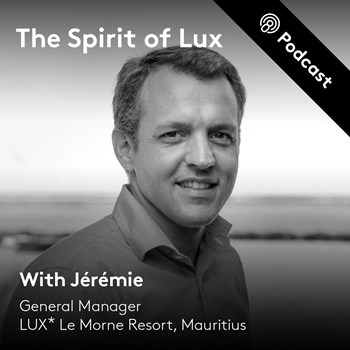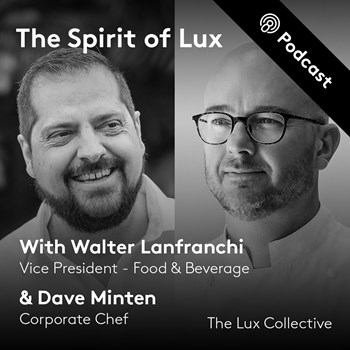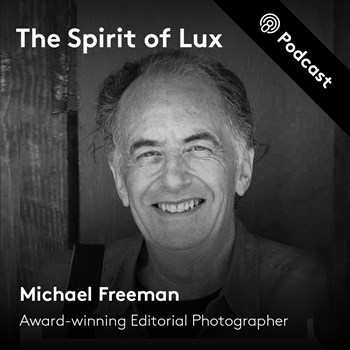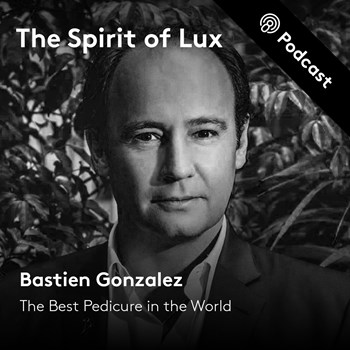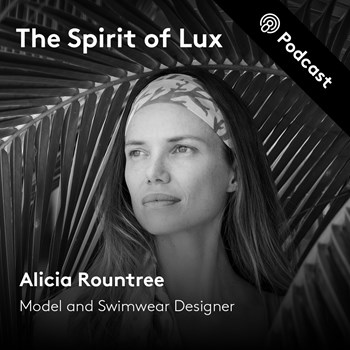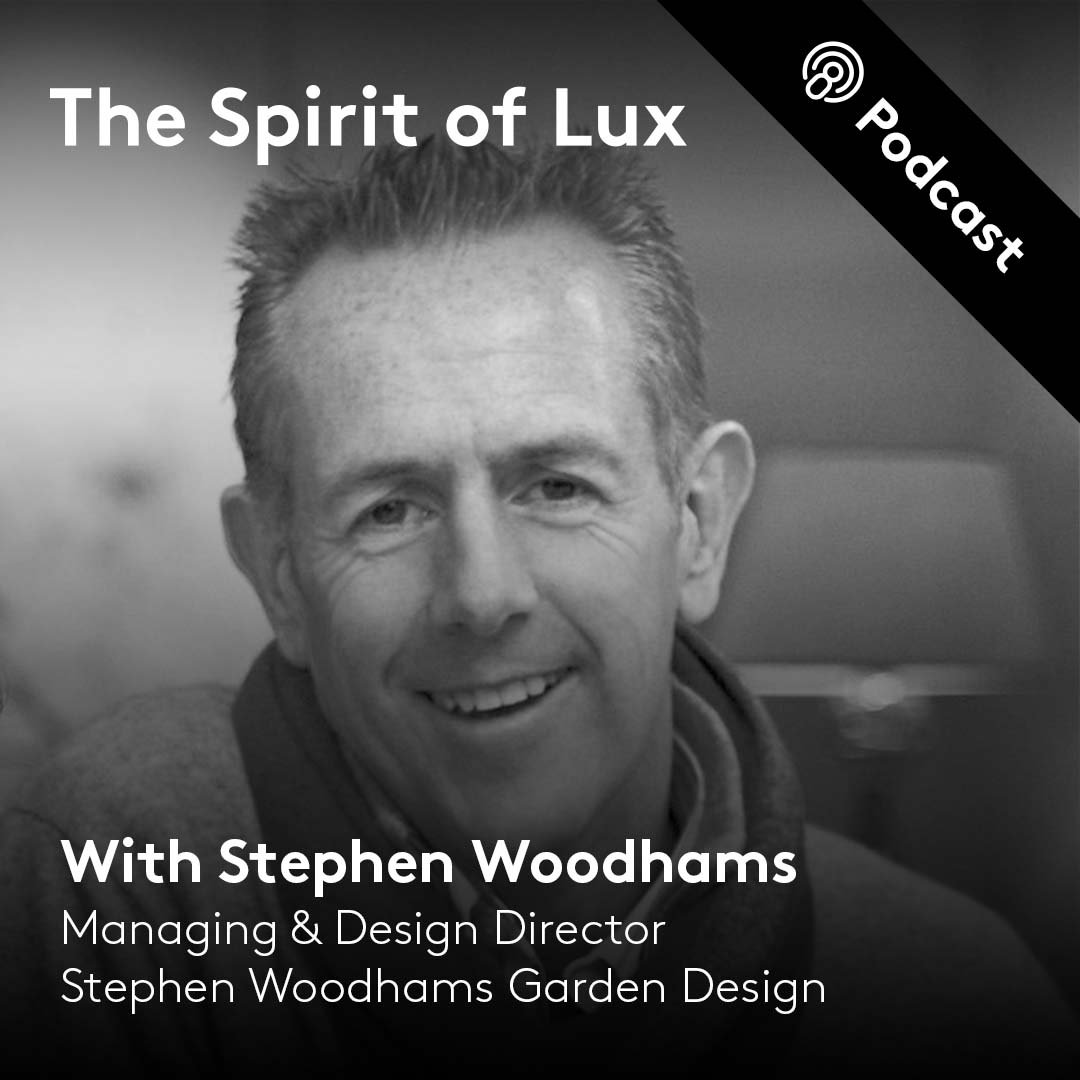 In the eleventh episode, Paul speaks with Stephen Woodhams, one of the youngest gardeners to ever win a gold medal in the renowned RHS Chelsea Flower Show, held in the United Kingdom every spring. Stephen’s magical touch, combined with his intuitive ability to turn any space into a tropical oasis, is one of the reasons why LUX* Belle Mare, LUX* Grand Gaube and the newly opened LUX* Grand Baie have received such tremendous acclaim all over the world. In this episode, Stephen speaks about his inspiration for the group’s latest flagship in Mauritius and his plans in this Indian Ocean paradise.
In the eleventh episode, Paul speaks with Stephen Woodhams, one of the youngest gardeners to ever win a gold medal in the renowned RHS Chelsea Flower Show, held in the United Kingdom every spring. Stephen’s magical touch, combined with his intuitive ability to turn any space into a tropical oasis, is one of the reasons why LUX* Belle Mare, LUX* Grand Gaube and the newly opened LUX* Grand Baie have received such tremendous acclaim all over the world. In this episode, Stephen speaks about his inspiration for the group’s latest flagship in Mauritius and his plans in this Indian Ocean paradise.
A Conversation with Stephen Woodhams: Award Winning Landscape Artist and Garden Designer
Paul Jones: I am Paul Jones, and you are listening to the Spirit of Lux.
Stephen Woodhams: Whenever you’re designing gardens, it’s always about trying to create moments and it’s about creating vistas and views. That’s something that is really important in any landscape. And that’s so majestic as you look out. It’s a very strong visual identity.
Stephen Woodhams: What I loved about Mauritius is you’ve got such a great wealth of plant material. Being tropical gardens, the breadth and the varieties of plants are so amazing.
Stephen Woodhams: You walk out through the lobby and down in through Beach Rouge, you just get this wonderful feeling of space and a calm sort of serenity. And I think that bay gives you that feeling, which is really magical.
Paul Jones: Greetings from Mauritius and here we are at the beautiful, gorgeous LUX* Grand Baie, the most amazing resort hotel that we'll open very soon. We're in the final stages of putting the finishing touches to this beautiful place. And I have the great pleasure to be sitting with one of the most famous and the most talented landscape architects in the world, Stephen Woodhams. Stephen hails from London, England. And he arrived on the island a couple of days ago to come and visit his masterpiece and put his finishing touches to the landscape and the various parts around the hotel. So, Stephen, welcome. Delighted to have you with us here in the beautiful island of Mauritius. And let me ask you the first question, Stephen, what was your first reaction when you walked into LUX* Grand Baie?
Stephen Woodhams: I have to be quite honest, Paul, obviously, working with you over many years and many projects, this one has completely blown me away. I think when you see things on drawings, and obviously we worked on this project since 2016 was the initial conversations, and just to see the scale -- the scale of the lobby, for me, it's cathedral-like, it's quite amazing. I can't quite align it to which cathedral but it's pretty stunning, I have to say. And I think this is one of the most beautiful bays here in Mauritius, I think Grand Baie. And what's so lovely is the site has changed beyond recognition because the site hasn't grown any bigger. But actually, now you walk out through the lobby and down in through Beach Rouge, you just get this wonderful feeling of space and a calm sort of serenity. And I think that bay gives you that feeling, which is really magical.
Paul Jones: And Stephen, we met originally in London about 20 years ago. And I think the very first project that we did together was LUX* Belle Mare, where you adopted a very revolutionary approach to landscaping in Mauritius. Tell us a little bit about that.
Stephen Woodhams: What I loved about Mauritius is you've got such a great wealth of plant material. Being tropical gardens, the breadth and the varieties of plants are so amazing. And I think I didn't do anything different to maybe any other landscapers over the years. I took all that same range of plant material. But I just decided that maybe to do the planting in more of a contemporary style to go with the evolution of interior design. And obviously, we were fortunate as part of the team to work with Kelly Hoppen and Kelly's interiors have often over many years featured stripes and parallel lines, which is something that I've always liked in the landscape. So, I really picked up on that. We've previously worked on that idea on a few of our Mediterranean gardens. And it was just a lovely opportunity to sort of introduce linear planting into the scheme of Belle Mare. Used all the plant material that is here on the island and used in many different locations. But we just planted it in parallel lines. And the beauty of that is that you have quite a strong plant architectural direction, that it looks very strong. But of course, as the plants grow, the image also softens which is rather nice, but it's a very strong identity. And I think what's been really lovely, obviously Belle Mare was the first one, and I think it was pretty radical because nobody had ever done that here in Mauritius before. Obviously we were fortunate to follow on with Grand Gaube and we've also done that feeling there, too. And here at Grand Baie, I wanted to have a slight feeling of that. But I think just because I wanted to give the hotels kind of maybe more like a brotherly-sisterly relationship, if it were to be a guest staying in one of the hotels at any particular time, they might just sense that little bit of connection from one hotel to the other. I mean, obviously, each hotel is different because its location and its feeling, and obviously things change and adapt. The use of materials now that we're using, that's what's been so great here at Grand Baie. We've used a resin bound path, which looks a little bit like a gravel, but it's a solid surface, and it's lovely to walk on. It's a great colour. But again, when we first did Belle Mare, that material wasn't even in the marketplace. So, I think it's really lovely working with the architecture. We've been able to use different materials to create different identities.
Paul Jones: Indeed, and Belle Mare has won many awards. And your landscape has definitely contributed to that enormously. Stephen, you mentioned the Mediterranean. And as much as you love Mauritius, you love another island equally. Which island is that?
Stephen Woodhams: I've always loved Ibiza, which is part of the Balearic Islands. And I'm fortunate to have a design business and we work a lot in the Balearic area. So, that's Mallorca, Ibiza and Menorca. We mustn't forget Formentera, which is just by Ibiza. And I think it's also interesting because I think what I love about Mauritius. I mean, to me, Mauritius is the tropical version of Ibiza. It's got a lovely serenity and a lovely calm feeling about it which you get into Ibiza because you've got the rock in Ibiza, which is called Es Vedra. And that's where the two magnetic ley lines cross and the energy that you get in Ibiza. And that's why all the hippies went there in 40s and 50s. I kind of feel that when you're in Mauritius, you have that very calming feel too. And obviously, I met you first of all at Le Touessrok, many, many years ago, and just the energy of the island and the people. I mean, that's the other thing. I think Mauritian people are so wonderful, they have a very calm energy about them, and that I really relate to as well. That's really nice. I think, obviously, horticulture on the island is something we need to develop and do more with. And I think maybe a training program would be great to try and initiate here in Mauritius. But the people are very caring. And I think that comes across in all levels, whether it be hospitality, whether you go out diving or you're going to do various things. They're very caring community, which I really like.
Paul Jones: Absolutely. I couldn't agree with you more. So, you mentioned Ibiza, and when I think of Ibiza, I think of beach clubs. So, Stephen, how would you compare our beach club here at LUX* Grand Baie? That's the Beach Rouge with the beach clubs in Ibiza.
Stephen Woodhams: I think it was so lovely. As I said earlier, this is the tropical version of an Ibiza beach club and I think that's what's going to really appeal to guests. I think people wanting to come and visit the island maybe for the first time or as a repeat guest I certainly would want to be coming to Grand Baie to experience that magic. And the Beach Rouge pool, I mean, that's really evolved from being as it were at Belle Mare, it was on a separate piece of beach a little bit away from the hotel, and you had a lovely beach view. But now Beach Rouge here has got its own pool, it's got its own feel. So, it is very much a beach club. The music's great. This morning when I was just having breakfast, just the sound of the birds was magical. I woke up with birds singing this morning, which was really lovely. So yeah, you can't beat that. That's very special.
Paul Jones: Absolutely. And we were very fortunate to have the possibility to create the sunken lounge in the gymnasium, the location of the former hotel that was occupying the site before. And when I look at that, I think of one of the hotels that I was operating way back when in Mexico, in Cabo, and I see that that you've adopted some of that styling from Cabo around that polished plaster, marble plaster sunken lounge, which has been happily decorated by Kelly, but tell us how you approached that which is adjacent to the Beach Rouge Beach Club.
Stephen Woodhams: I wanted to kind of give that a slightly different vibe. I mean, obviously it's set amongst all the other planting. So, there we've used quite a good selection of cactuses, and more succulents. And I think we're actually going to mulch that area maybe with sand so that it really has got that kind of Mexican vibe to it. And there's more lovely pots to go into that area. I think it's giving it a really sort of chill-out lounge sort of vibe to it, which I think is really lovely. And the view from there is absolutely breathtaking out across the bay. So, it's a magical place for sunset drinks. I think people would be really wanting to really utilize that space. It's going to be chilled laidback feel, which I love.
Paul Jones: Yeah. And Stephen, when the guys were demolishing the hotel, I remember you were insisting on marking up many, many trees on-site, which had been here for forever. And now, when you look at the property and you see those very same trees that you kept, you must be immensely proud of your instinctive preservation of those trees.
Stephen Woodhams: I think it's also really important. When you have a site, you need to have a nod to the past. And obviously, the hotel had this ability. This must be what, in the last 15 years, the first brand new hotel to be built here in Mauritius, and that's hugely exciting to be able to do a new build. But I think by keeping the major trees and the palms that were here, it now just gives the feeling a real sense of place. And it doesn't feel as though it's just arrived, or it's just been landed by helicopter, it really nestles into the landscape. So, I think the very tall planting, the stuff that's got really good scale, is working really, really well. And we've just got to wait maybe a year to get this mid story a little bit higher, and then it'd be really, pretty magical. I mean, the big trees and palms is purely magical. And I think it works very, very well.
Paul Jones: I think magical and majestic as well. Majestic with the height of those palms. I mean, I'm looking out the window here, at those palms, they're reaching for the sky. I mean, they are so tall, and wonderful. They really are sculptural and majestic. And wow! Amazing.
Stephen Woodhams: When I think here, they work particularly well, because it's literally an avenue around this curve pool. And the whole idea about doing the curve pool, which is the second pool on the site, was just to really try and mimic the semi-circle, the flow of the Bay, which is really the feel of it. And also, then that was linking in with JFA, with the architecture that all the rooms are on this wonderful curve. So, all of these rooms have got a bay view out to see which is cool.
Paul Jones: Indeed. And then you created the palm grove where you're adding these special relaxation places in front of the crescent pool.
Stephen Woodhams: Well, those are really wonderful little semicircle dining areas, which will be really great for guests to be able to book those to maybe take lunch or a romantic dinner. It's a really lovely spot. Again, just to be able to sit underneath a tree and have a lovely lunch in the shade looking out to the bay, which is it really works well.
Paul Jones: And the hammocks strung in under the coconut trees.
Stephen Woodhams: We've just got to wait a little bit for putting the hammocks up because obviously those palms have only just got in. And if we put the hammocks up now, I'm just a little bit worried I might have a few palm trees falling over. So, we've just got to hold on a few months to get those palms really well rooted. That will be the idea.
Paul Jones: Right. Now, tell us about the sculptures. Every landscape architect always has certain sculptural features that really put the finishing touch and I believe here you've got several, and using a material that has not been used in Mauritius to my knowledge before but it's an absolutely gorgeous material. I see it in where I live in in Singapore. Tell us about those sculptural elements.
Stephen Woodhams: When I first saw the designs for the architect JFA, obviously the use of a lot of the materials that have previously been used on hotels in Mauritius and obviously using the sugarcane for the thatch, using timber, much more kind of natural organic materials, and I really wanted to try and work alongside that feeling. So, we've introduced Corten steel which is a lovely metal which naturally rusts down to a certain level. So, it's got this kind of lovely rusty kind of orangey texture to it.
Paul Jones: Gorgeous.
Stephen Woodhams: And it complements natural wood really well once it gets that kind of rust colour through. We've used it here for water features. Where the villas are, we've done some beautiful moon gates, which once they really rust up and get the texture and the colour, they really work well. And it's just another natural kind of feeling-- using natural metals. I think just brings out all the colours that have been used throughout and it links into the rooms as well because I'm just looking at the curtain drapes here. There's a lovely kind of beigey sort of colour. It's quite nutty and cream and beige, it really works well.
Paul Jones: Fantastic and that entrance. Wow! Stephen, you've really done us proud with the porte cochere with the amazing water feature that drops into the court and basin, which is absolutely wow. I think this hotel is going to be a series of wow points, which the cliché is Instagrammable moments. But that entrance, I arrived this morning, and woah! It's just absolutely breathtaking, absolutely breathtaking.
Stephen Woodhams: Well, I think it's really wonderful when you arrive, you take this lovely experience, because you're actually driving up, you're driving up to almost first floor level, which is just a lovely sense of arrival if you're going up a slope, and it's an almost an in-and-out drive. And we've obviously saved the big trees that are there. So, you're actually driving through a wonderful pair of trees, it's very majestic and the scale. I mean, it's just so over scaled. And a lot of our landscape design over the years has been about over-scaling. When you see some of the pots in the lobby, which are really majestic like the palm trees, they're really over-scaled. And I think that's kind of part of the fun, it's about thinking on a much bigger scale, so that it really works, it gives it a lovely sense of arrival.
Paul Jones: Yes. Driving through that framing of those two majestic banyan trees at the entrance, you're already setting the scene with those two trees, and you know you're in for a real treat when you pass through. And then it's just, as I said, one after the other of your plants, your trees and your water features and your sculptures, and people are drawn in to the space as you call it the cathedral-like space. And when they walk to the end, then they see this fabulous sculpture in the middle of the reflecting pond. How did that all come about, Stephen?
Stephen Woodhams: Well, the idea really is twofold, because obviously, when you're looking out, you've got the wonderful view of the bay, which is quite stunning. But I wanted to do a reflective pool there. So, that also when you're in the signature restaurant, you're looking out across water, and the water is the same level as the tabletop. So, the reflections at nighttime are purely magical. And I think also there, we'd wanted to feature water as well as fire. So basically, it looks as though the water is actually holding up the Corten steel bowl, which has the flames, essentially, which again at nighttime just looks amazing. It's the vista, it's the views. And whenever you're designing gardens, it's always about trying to create moments and it's about creating vistas and views. That's something that is really important in any landscape. And that's so majestic as you look out. It's a very strong visual identity.
Paul Jones: Indeed. And that signature restaurant, which is called Ai KISU, in Japanese means flame, and you enter and you see the flame shooting up through the Corten steel bowl, and as you say, held up by the gushing water. And then when you look left, do you see the warayaki flames of the grill of that special cooking technique that Chef Yussuf is engaged with these beautiful flames. It's really an experience, this restaurant, when you come in with the flames in front of you, the flames on the side. And then throughout your meal experience, you see the flames everywhere, even in the bar, the mixologists are making drinks with flames. And it's really very magical. And you've done a lot of indoor planting as well. How have you done that?
Stephen Woodhams: Well, basically the whole idea is that, and I think it works particularly well in Mauritius, that it's meant to be a seamless link between the inside and outdoor spaces. I quite like it as you're walking through somewhere, you're not quite sure am I inside, am I outside? So, it's that kind of dissolving walls and not necessarily seeing where the boundaries are between inside and outside. So again, the containers used in the lobby are all over-scaled with majestic planting. And the identity for this hotel, Paul, really was to use much stronger, more architecturally based plants. So, big leafed plants-- plants sort of got more structure to them. So, we've used Strelitzia, we've used Schefflera-- things with very large leaves, very sculptured, which I think then also relates back to the architecture because the architecture is visually very strong.
Paul Jones: Yes.
Stephen Woodhams :And the combinations of the strong identity with the planting and the architecture and the interiors as well, it just gives it a very cohesive identity.
Paul Jones: Right, both front and back as well. Because the corridors, they're not attached as they are normally with hotels. They are, in fact, detached with this whole metal structure, which then you are invited to accessorize, if that's the correct word, with planting and creepers and everything, so that the guest experience walking back and forth from their room and up the lovely spiral staircases would be a breathtaking experience. So, how have you achieved that?
Stephen Woodhams: That's all about sort of elevated walkways. So, it's about seeing gardens on different levels. And I think what's lovely in a normal landscape, obviously, you can create sunken areas and different levels. But here, on the corridors, we've got lovely raised planters, and they run all the different levels. So, the whole idea of the plants will be cascading and tumbling from all the different levels. So, you'll have this wonderful kind of walkway through jungles sort of style planting. It's got a very lush feel about it, which is going to be superb. We've used some of the corridors, which is wonderful, it does have some areas of shade. So, we can use lovely ligularia palms, which is the lovely big fan shaped palm, which just looks amazing in those sorts of settings.
Paul Jones: Right. And now, last but not least, Stephen, as you know, I live in Singapore, and from my office, I see the Marina Bay Sands. And I remember talking of one of our envisioning sessions that we had right in the early days when we were conceptualizing the hotel, that we wanted a rooftop. So, looking at the boat on top of Marina Bay Sands, as I'm working, I said, "Well, I want one of those." Obviously, we couldn't achieve quite that. But I think that we've got something amazing with our rooftop that we've called Bisou. So, how did you approach that, Stephen?
Stephen Woodhams: I've always wanted to do a rooftop garden here in Mauritius. Again, I think it's the first. I don't know any other hotel that's got a rooftop pool, and the whole idea that you've just taken the landscape literally up onto the roof. So logistically, that has to be thought out. And we had this lovely opportunity by building a brand-new hotel, to be able to create really massive planting pits so that we could literally have fully grown palm trees on the roof. And obviously, the engineering of the building is really important in the early stages to make sure we can secure all those palm trees. So, we've actually used a metal cabling system, which is all underground. So, those root balls of those palm trees have metal cabling going over the root ball to stop it either blowing out or falling out, as it were. And obviously, those have just gone in, they're going to take a good 6-12 months to really get well rooted, and that'll keep them safe and secure. But just the shadows and the play of lights on the roof there is quite something else. And again, it's a curved pool. So, it's linking in with the Grand Baie here itself in its shape, because it's curved. And we had that lovely ability to put sun lounges in the water. Also, we've created, together with JFA, some lovely little seating areas where you can actually be sitting in the water and having lunch round a table, again, with the view out across the bay, which is quite breathtaking. But again, the use of plant material up there is very architectural, it's very strong in its feel, and just gives you this amazing kind of feeling that you've been taken somewhere else. I think that's the sense of any good garden that you need to be almost transported to a different place. But you're sitting in the one position. I certainly I would be spending nearly all my time up on the roof, if I could have time. It's a lovely spot and it's pretty breathtaking. And again, it changes during the day. At daytime, it has one kind of a vibe. But at night, it just blows you away with the feeling you know, it's got a very strong identity at night. It's about colour. I'm not going to say any more. I think you've got to come and see it. I don't let too many secrets out.
Paul Jones: Stephen Woodhams, any final thoughts on LUX* Grand Baie Mauritius?
Stephen Woodhams: To me, it's the most magical island. And as you know, we worked on the Maldives project, which was a really wonderful project to work on. That was the hardest place to garden. I think what's lovely now is this is our third project here in Mauritius and I think this one is the one I'm going to be most proud of. It's funny how things could take leaps and bounds. But I think this is on a different scale. And I think everybody would love to come and see it.
Paul Jones: And I almost forgot that, what you've introduced here are those beds of planting of trees and different tropical plant species that will enable in the layered format, the privacy for the junior suites on the ground floor to realize. So, I think you've done an excellent job, Stephen. We're very proud of the work that you do with us because it certainly complements the architecture by Jean Francois, as well as the interior designer, Kelly Hoppen, and the different consultants. I'm thinking of Rob and Larissa, who've done a wonderful job on lighting because all your landscape gets lit up beautifully at night and really shows it off in all its glory. So, Stephen Woodhams, thank you so much. It's been a real pleasure and an honour to talk with you this morning. I'm sure the listeners who've listened in to this podcast will be delighted and looking forward to see more of your realizations. And of course, I almost forgot. Congratulations. You are a judge at the Chelsea Flower Show. Having been the youngest winner, you're now a judge. So well done, Stephen.
Stephen Woodhams: Well, thank you very much, Paul. I kind of feel now I've become a judge, I'm feeling a little bit old. I quite liked being the youngest person to win a gold at Chelsea. But the magic here is something that has been lovely to have the opportunity to put a landscape together with such a great team. It's been really a lovely experience.
Paul Jones: Thank you so much, Stephen.
Stephen Woodhams: Pleasure.
Paul Jones: Thank you for listening to The Spirit of Lux with me, Paul Jones. If you liked what you heard, don't forget to subscribe to our channel on Apple Podcasts, Spotify, or wherever you listen.


